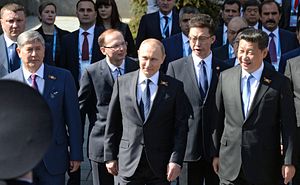Kyrgyz President Almazbek Atambayev has a busy travel schedule ahead of him, but it just got a little lighter. In September, the Kyrgyz president will visit China and Iran, but his planned working visit to the United States, to attend the 70th session of the United Nations General Assembly, has been cancelled. Official sources say the cancellation is because of the upcoming parliamentary elections, which were recently scheduled for October 4.
Atambayev will make a three-day official visit to China next week. During the visit, he is expected to sign a number of agreements, paramount among them a 10-year cooperation program. Speaking at a press conference, the head of the administration’s foreign policy department, Sapar Isakov, said that Kyrgyzstan and China are set to sign a cooperation agreement worth $1 billion yuan (over $150 million USD) for the promotion of major projects over a three-year period. The first tranche of $350 million yuan ($54 million USD) is targeted at rehabilitating roads in Bishkek.
Atambayev will be meeting with Chinese President Xi Jinping. Isakov commented that Kyrgyzstan’s accession to the EEU presents an opportunity for the Chinese to invest. While Kyrgyzstan’s market is small in Chinese economic calculus–with a population of just 5.7 million–the EEU is a market contains a population of over 170 million. Still, most of that is Russia (with a population over over 140 million), with which China already does a great amount of business directly.
On September 3, Atambayev will be among 30 heads of state attending Beijing’s military parade and other events commemorating the 70th anniversary of the end of World War II. Isakov said at the press conference that a squad of Kyrgyz national guard soldiers will be marching in the parade. Kyrgyz National Guard Commander Satybaldyev Melis told Xinhua that Kyrgyzstan has been very diligent about training and selecting the very best soldiers to send, saying, “A total of 83 soldiers were picked out of over 200 troops for the Beijing grand parade, they are highly disciplined, skillful and all above 1.8 meters in height, with other factors like facial features also being taken into account.”
After the festivities in Beijing, Atambayev is scheduled to travel directly to Iran for what Isakov described as a planned trip from September 4 to 6. He again highlighted Kyrgyzstan’s membership in the EEU as a selling point, saying that “The President will hold meetings in narrow and expanded format with the head of Iran, its parliament speaker and spiritual leader.” A joint statement between Atambayev and Iranian President Hassan Rouhani is expected to be signed, alongside a few other agreements.
One country Kyrgyzstan’s leader will not be visiting in September is the United States. Although Atambayev had previously planned to attend the 70th United Nations General Assembly session in New York, which takes place from September 28 to October 6, it was announced today that he has canceled the trip. Kyrgyz and U.S. relations hit a rough patch last month when the U.S. State Department honored a jailed Kyrgyz activist, Azimjan Askarov, with a human rights defender award. The row led to the scrapping of a treaty between the two countries.
The decision to cancel the trip was made, according to the administration, because the upcoming parliamentary elections were ultimately scheduled for October 4. The election will be incredibly important, not just in a political sense but a procedural one. The elections will debut the use of biometric registration for voting. The system is controversial; some argue that requiring fingerprint registration in order to vote will disenfranchise those who do not register; some worry about technical problems barring some from voting on election day and the lack of contingency planning on the part of the government; others have deep concerns about privacy, manipulation, and misuse of data.
Needless to say, even though Atambayev is not on the ballot this round, the election will reflect on his administration.

































